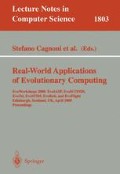Abstract
We introduce a test environment based on the optimization of signals approximated in function spaces in order to compare the performance of different evolutionary algorithms. An evolutionary algorithm to optimize signal representations by adaptively choosing a basis depending on the signal is presented. We show how evolutionary algorithms can be exploited to search larger waveform dictionaries for best basis selection than those considered in current standard approaches.
Access this chapter
Tax calculation will be finalised at checkout
Purchases are for personal use only
Preview
Unable to display preview. Download preview PDF.
References
M. Antonini, M. Barlaud, P. Mathieu, and I. Daubechies. Image coding using wavelet transform. IEEE Trans. on Image Process., 1(2), April 1992.
G. Beylkin. On the representation of operators in bases of compactly supported wavelets. Society for Industrial and Applied Mathematics, 6(6):1716–1740, December 1992.
C. M. Brislawn. Two-dimensional symmetric wavelet transform tutorial program. Technical report, Los Alamos National Laboratory, December 1992.
J. Buckheit and D. L. Donoho. Wavelab and reproducible research. Technical report, Department of Statistics, Stanford University, 1995.
I. Cohen, S. Raz, and D. Malah. Orthonormal shift-invariant wavelet packet decomposition and representation. Signal Processing, 57(3):251–270, March 1997.
R. R. Coifman and M. V. Wickerhauser. Entropy based methods for best basis selection. IEEE Trans. on Inf. Theory, 38(2):719–746, 1992.
G. Davis. Baseline Wavelet Transform Coder Constrution Kit. Mathematics Department, Dartmouth College, January 1997.
D. E. Goldberg. Genetic Algorithms in Search, Optimization, and machine learning and Filter Banks. Addison-Wesley, Reading, Massachusetts, 1989.
John R. Koza. Genetic Programming-On the Programming of Computers by Means of Natural Selection. MIT Press, Cambridge, MA, 1992.
Z. Michalewicz. Genetic algorithms + data structures = evolution programs. Artificial Intelligence. Springer-Verlag, New York, 1992.
J. Villasenor, B. Belzer, and J. Liao. Wavelet filter evaluation for image compression. IEEE Trans. on Image Process., 4(8):1053–1060, August 1995.
M. Wall. GAlib: A C++ Library of Genetic Algorithm Components. Mechanical Engineering Department, Massachusetts Institute of Technology, August 1996.
Author information
Authors and Affiliations
Editor information
Editors and Affiliations
Rights and permissions
Copyright information
© 2000 Springer-Verlag Berlin Heidelberg
About this paper
Cite this paper
Ferreira da Silva, A.R. (2000). Evolutionary Wavelet Bases in Signal Spaces. In: Cagnoni, S. (eds) Real-World Applications of Evolutionary Computing. EvoWorkshops 2000. Lecture Notes in Computer Science, vol 1803. Springer, Berlin, Heidelberg. https://doi.org/10.1007/3-540-45561-2_5
Download citation
DOI: https://doi.org/10.1007/3-540-45561-2_5
Published:
Publisher Name: Springer, Berlin, Heidelberg
Print ISBN: 978-3-540-67353-8
Online ISBN: 978-3-540-45561-5
eBook Packages: Springer Book Archive

